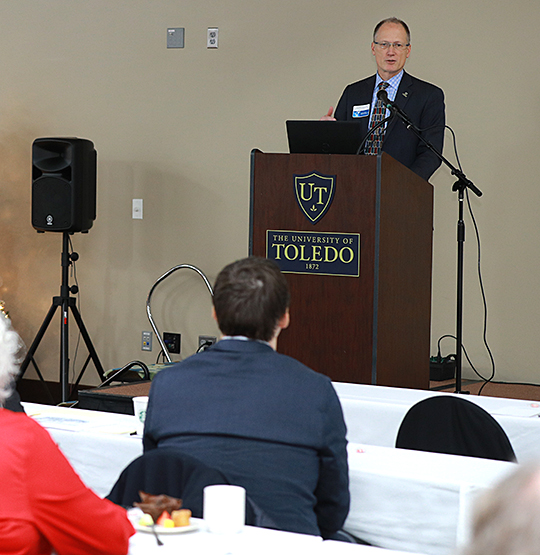The University of Toledo’s research in immune therapy and precision molecular therapy for treating cancer was acknowledged in 2018 as an area of emerging research excellence with the potential to generate national attention.
At UT’s second Cancer Research Symposium held late last year, Dr. Christopher Cooper, executive vice president for clinical affairs and dean of the College of Medicine and Life Sciences, told assembled faculty and students from across the University they must all work together to turn that potential into reality.

Dr. Christopher Cooper, executive vice president for clinical affairs and dean of the College of Medicine and Life Sciences, delivered the opening remarks for the 2018 UT Cancer Research Symposium. The event, held last month, focused on the work of UT researchers whose findings are advancing precision cancer therapies.
The symposium, attended by more than 120 physicians, research scientists and students, was focused on UT’s efforts to create a precision cancer therapy program that will develop more targeted treatments thanks to the huge scientific advances in how we understand not just cancer, but the way it affects specific individuals.
It was only two decades ago that scientists decoded the human genome and just a decade ago that scientists first sequenced one individual’s DNA. At the time, those were extraordinarily lengthy and expensive projects. Today scientists can sequence an individual’s DNA for roughly $1,000, said Dr. F. Charles Brunicardi, director of the Cancer Program in the College of Medicine and Life Sciences.
“We think it will keep decreasing in cost where it will become a routine part of every one of our medical charts,” Brunicardi said. “And that’s where we’re trying to go today with a precision cancer therapy program where we’re using foundation medicine to sequence patient’s cancers and then tailor the therapy toward the targets that we find.”
The symposium featured nearly two dozen UT faculty presenters from the College of Medicine and Life Sciences, College of Pharmacy and Pharmaceutical Sciences, and College of Natural Sciences and Mathematics who discussed topics including genomic sequencing, immunotherapy for breast cancer, novel drug discovery, and how drugs already approved by the U.S. Food and Drug Administration might be able to be repurposed for cancer treatment.
The event also featured a keynote address from Dr. Jian-Ting Zhang who provided perspectives on establishing a targeted drug discovery program. Zhang, formerly professor of pharmacology and toxicology at the Indiana University School of Medicine, will join UT as chair of the Department of Cancer Biology in the College of Medicine and Life Sciences in February.
“This is the best of academia, where we bring together people from different disciplines and different approaches and we tackle important problems that matter to our community, our region and our world,” Cooper said.
More information about the symposium and the presented research can be found by visiting the UT Cancer Research Symposium website.